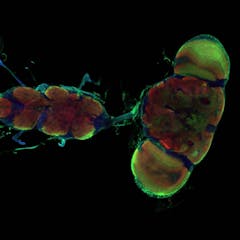
Articles on Research Brief
Displaying 301 - 320 of 413 articles

This finding was a surprise, since consumers actually seem to think liberals will provide better service.

Long distances often preclude families in the Motor City from sending their kids to the best schools in the area, new research shows.

Researchers consider how friendships that bridge across social class – “cross-class friendships” – contribute to middle school academic achievement differences based on level of parents’ education.

Using the incredible wealth of fossil data and a modern ecological theory, researchers estimated population density for the extinct apex predator.

Even when the economy is strong, these young adults face economic hardship.

Adaptable neurons are tied to learning and memory but also to neurological disorders. By studying fruit flies, researchers found a mechanism that controls neuroplasticity.

Not all free college programs are the same. New research finds that eligibility requirements and other features influence outcomes.

The findings suggest that many Black and Hispanic Americans don’t believe health care providers are listening to them.

Making biofuels from crops grown on land poses trade-offs between food and fuel. A new study looks offshore.

A parent’s or grandparent’s stressful experiences change how their offspring behave. And it turns out that moms’ experiences produce different changes in kids than dads’.

Students who took part in the program scored 8% higher on the state science test than students who received traditional instruction, and demonstrated greater social and emotional learning.

A new study finds egalitarian nations have had fewer COVID-19 deaths than individualistic ones like the US, a new study finds. But women’s leadership may have something to do with their success, too.

The first survey of its kind in 15 years also indicated that the number of couples in which one partner makes decisions about giving for the whole household is rising.

Male rats transfer different hereditary information to their offspring depending on their age.

New research uncovers sizable gaps in how college students from different ethnic backgrounds trust the people in charge of their schools. Could a history of racism be to blame?

A community’s wastewater can predict coronavirus cases that haven’t yet been diagnosed. The quicker that information is known, the better.

Growing weed indoors is not an environmentally friendly process. Climate controls create a lot of greenhouse gas emissions, and where the pot is produced has a huge influence on emission levels.

In some cases, big donors are supporting higher education to support a philanthropic strategy that includes racial and economic justice.

Fungi are a small but important part of the gut microbiome. A new study in mice shows that how much weight mice gain on a processed food diet depends on this fungal microbiome.

Contrary to popular belief, falling natural gas prices didn’t significantly accelerate coal power plant retirements. Here’s what did.

